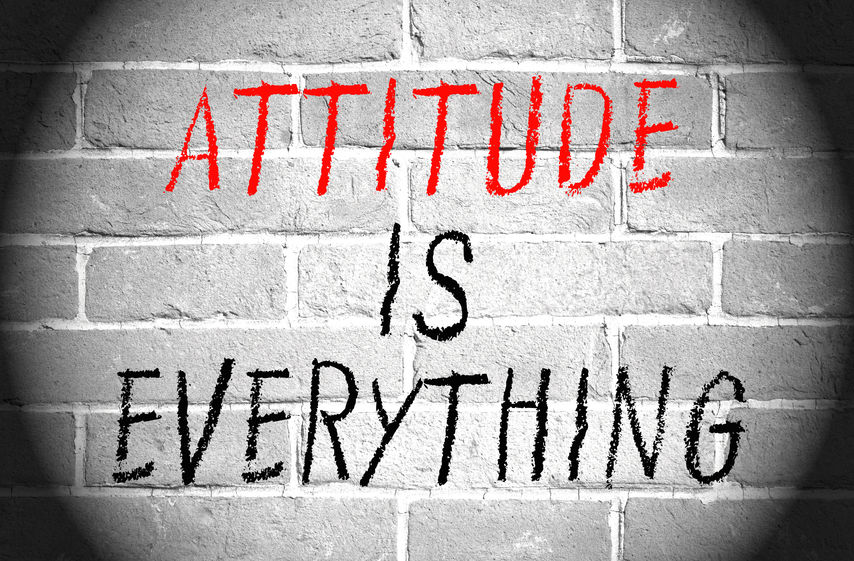Self-talk — the “verbalizations or statements addressed to the self” (Hardy 2006, p. 84) — has been widely examined in sport psychology. Self-talk can be positive or negative, spoken aloud/externally or silently/internally, and be instructional or motivational. The research literature has shown that “self-talk is beneficial for athletic performance” (Tod, Hardy & Oliver 2011, p. 675); and motivational self-talk can reduce perceived exertion and enhance endurance performance (Blanchfield et al. 2014; Barwood et al. 2015).
But does the grammatical form of self-talk influence its effectiveness? To date, researchers have pursued a few different avenues to try to understand what forms of self-talk might work best, including the use of first person (“I”) vs. second person (“you”) and the use of statements (I will) vs. questions (Will I?). Here’s what the research evidence shows followed by some practical advice for engaging in self-talk to enhance your motivation and endurance performance.
“You’ve got this!” vs. “I’ve got this!”
Research by James Hardy and colleagues (2019) demonstrates that speaking to yourself in the second person (“you”) during endurance activities results in improved performance vs. using the first person (“I”) in self-talk. Their study tested these different grammatical forms on cyclists engaged in a 10-kilometer time trial. Study participants performed the time trial twice on two separate visits so that they used a different pronoun in their self-talk during each of the two visits (with the order randomly assigned). “When using second-person self-talk, participants completed the 10km cycling TT significantly quicker, worked harder, yet did not perceive there to be a difference in effort compared to when completing the task in the first-person self-talk condition” (Hardy et al. 2019, p. 2126). Using “you” in the self-talk led to faster times and greater power output without any perception of working harder to achieve those results. As Hardy and colleagues summarize, “This implies that second person self-talk is a more efficient perceptual strategy (i.e., greater absolute workload for no ‘cost’ in RPE [rating of perceived exertion]) for endurance athletes during exercise” (p. 2126).
Why? Although a definitive reason is difficult to pin down, Hardy and colleagues offer several possible explanations. One explanation found in the psychology literature is the idea of self-distancing. Addressing ourselves in the second person (“you”) keeps us from becoming too self-immersed, providing a check on perspective that allows us to better regulate thoughts and actions under stress (Kross et al. 2014). Similarly, the concept of a “time wedge” (Gibson and Foster 2007) explains how athletes open up space between the self and the activity, increasing awareness and self-observation. Another explanation comes from the idea of active self-regulation (Brick et al. 2014) where the athlete places greater attentional awareness on aspects of their performance without increasing perceived effort. This has been shown to aid cognitive control, for example, during running events (Brick et al. 2015). A final explanation has to do with the way second-person self-talk shapes our appraisal of that talk. Speaking to ourselves in the second person (“you”) leads to appraising the talk more as a (positive) challenge rather than a (negative) threat (Kross et al. 2014). Whatever the specific reason, the evidence points to a potential benefit of speaking to ourselves in the second person (“you”) during our self-talk.
“I will!” vs. “Will I?”
Another interesting line of research explores whether using self-posed questions in self-talk may be more effective at motivating goal-directed behavior than declarative statements (Senay et al. 2010, Godin et al. 2012). Is there a difference between simply stating that we will do something versus asking ourselves whether we will do it?
Through a series of experiments that explored the priming effects of different grammatical constructions — e.g., I will vs. Will I? — Ibrahim Senay and colleagues (2010) found that asking ourselves a question about potential behavior (rather than making a declarative statement about it) increases the likelihood of that behavior.
The motivational framework known as self-determination theory (SDT) (Deci & Ryan 2000) emphasizes that we are more likely to do something when we are intrinsically motivated rather than extrinsically motivated, when we feel personally invested and responsible for our actions rather than when we feel external factors are responsible — in other words, when our perceived autonomy is high. Questions, rather than statements, come across as less threatening to our personal autonomy (Ahluwalia & Burnkrant 2004). Imagine you’re at dinner and need the salt on the other side of the table. You’re more likely to get a positive response from the person sitting near the salt when you ask a question (“Can you pass the salt?”) rather than formulate it as a statement (“Pass the salt”). Self-talk is no different. As Senay and colleagues (2010) explain, “self-posed questions about a future behavior may inspire thoughts about autonomous or intrinsically motivated reasons to pursue a goal, leading a person to form corresponding intentions and ultimately to perform the behavior” (Senay et al. 2010). Prompting your desired behavior in the form of a question increases your intrinsic motivation to pursue those outcomes.
In further examination of this question-behavior effect using a longitudinal study, Gaston Godin and colleagues (2012) also found evidence to support the idea that “self-posed questions about a future action increases the likelihood of doing it.”
Both sets of studies, however, were in English and consisted of testing either a question or a statement. Can the effect be replicated in other languages? How might answers to the self-posed questions impact performance?
Małgorzata M. Puchalska-Wasyl (2014) replicated the study by Senay and colleagues (2010), but in Polish rather than in English, and also explored the influence of positive vs. negative answers to the self-posed questions. The replicated study arrived at different results in Polish from what had previously been found in English. Puchalska-Wasyl surmises that the Polish translation of the cues used in the English study — I will vs. Will I? — can be interpreted as more directive than their English counterparts, which leads to less autonomy than in the English case. The broader implication is that the effectiveness of self-posed questions may have to do with their level of directiveness (where less directiveness is more effective). In her exploration of how answers to self-posed questions (Will I do it?) impact performance, Puchalska-Wasyl (2014) found that positively answering those questions (Yes, I will) led to better performance than negative answers (No, I won’t). Interestingly, this was only true when the study participants viewed the question-answer sequence as a self-addressed directive (seeming to contradict the previous point that less directiveness is more effective).
Practical Applications
Although the evidence on the effectiveness of using questions vs. statements is less conclusive than the evidence on the effectiveness of using second person vs. first person in self-talk, I think the larger takeaway is that it’s difficult to isolate a singular grammatical form over another as better for performance because even our inner self-talk is fundamentally dialogic in nature. Self-talk is an internal dialogue where we adopt various positions and put different perspectives into conversation with one another. As Puchalska-Wasyl (2014) explains, “a question about future behavior addressed to oneself also demands an answer. In cognitive terms, it can be said that when people are in an interrogative mindset, they search for answers” (p. 377). This leads to some valuable practical applications.
Knowing that our self-talk is a form of dialogue, we can shape that dialogue to improve our motivation and performance. Try this as you practice your motivational self-talk during training and racing:
- Formulate declarative statements and mantras in the second person (“you”) — You’ve got this! You can do it!
- Formulate questions in the second person as the opening move in an internal dialogue that challenges you to answer — Can you do this?
- Be honest when answering, but if you really want to do it you’ll need to find a way to answer in the affirmative — Yes, I can do it!
- Continue the inner dialogue with a follow-up question to shift attention to the process needed to make it happen — If so, how?
- In your answer to that two-part question — Can you do it? If so, how? — outline the steps you need to take to get it done; then focus your attention on those intermediary process goals that will lead you to your performance and outcome goals.
Can you do it — and, if so, how?
References
Ahluwalia, Rohini and Robert E. Burnkrant. 2004. “Answering questions about questions: A persuasion knowledge perspective for understanding the effects of rhetorical questions.” Journal of Consumer Research 31(1): 26–42. https://doi.org/10.1086/383421
Barwood, Martin J.; Jo Corbett; Christopher R. D. Wagstaff; Dan McVeigh; and Richard C. Thelwell. 2015. “Improvement of 10-Km Time-Trial Cycling With Motivational Self-Talk Compared With Neutral Self-Talk.” International Journal of Sports Physiology and Performance 10(2): 166–71. https://doi.org/10.1123/ijspp.2014-0059
Blanchfield, Anthony William; James Hardy; Helma Majella De Morree; Walter Staiano; and Samuele Maria Marcora. 2014. “Talking Yourself Out of Exhaustion: The Effects of Self-Talk on Endurance Performance.” Medicine & Science in Sports & Exercise 46(5): 998–1007. https://doi.org/10.1249/MSS.0000000000000184
Brick, Noel; Tadhg MacIntyre; and Mark Campbell. 2014. “Attentional focus in endurance activity: New paradigms and future directions.” International Review of Sport and Exercise Psychology 7: 106–134. https://doi.org/10.1080/1750984X.2014.885554
Brick, Noel; Tadhg MacIntyre; and Mark Campbell. 2015. “Metacognitive processes in the self-regulation of performance in elite endurance runners.” Psychology of Sport and Exercise 19: 1–9. https://doi.org/10.1016/j.psychsport.2015.02.003
Deci, Edward L. and Richard M. Ryan. 2000. “The ‘what’ and ‘why’ of goal pursuits: Human needs and the self-determination of behavior.” Psychological Inquiry 11: 227–268. https://doi.org/10.1207/S15327965PLI1104_01
Gibson, Alan St Clair and Carl Foster. 2007. “The role of self-talk in the awareness of physiological state and physical performance.” Sports Medicine 37(12): 1029–1044. https://doi.org/10.2165/00007256-200737120-00003
Godin, Gaston; Ariane Bélanger-Gravel; Lydi-Anne Vézina-Im; Steve Amireault; and Andrea Bilodeau. 2012. “Question–Behavior Effect: A Randomised Controlled Trial of Asking Intention in the Interrogative or Declarative Form.” Psychology & Health 27(9): 1086–99. https://doi.org/10.1080/08870446.2012.671617
Hardy, James. 2006. “Speaking Clearly: A Critical Review of the Self-Talk Literature.” Psychology of Sport and Exercise 7(1): 81–97. https://doi.org/10.1016/j.psychsport.2005.04.002
Hardy, James; Aled V. Thomas; and Anthony W. Blanchfield. 2019. “To Me, to You: How You Say Things Matters for Endurance Performance.” Journal of Sports Sciences 37(18): 2122–30. https://doi.org/10.1080/02640414.2019.1622240
Kross, E.; Bruehlman-Senecal, E.; Park, J.; Burson, A.; Dougherty, A.; Shablack, H.; Bremner, R.; Moser, J.; and Ayduk, O. 2014. “Self-talk as a regulatory mechanism: How you do it matters.” Journal of personality and social psychology 106(2): 304–324. https://doi.org/10.1037/a0035173
Puchalska-Wasyl, Małgorzata. 2014. “When interrogative self-talk improves task performance: The role of answers to self-posed questions.” Applied Cognitive Psychology 28: 374–381. https://doi.org/10.1002/acp.3007
Senay, Ibrahim; Dolores Albarracín; and Kenji Noguchi. 2010. “Motivating Goal-Directed Behavior Through Introspective Self-Talk: The Role of the Interrogative Form of Simple Future Tense.” Psychological Science 21(4): 499–504. https://doi.org/10.1177/0956797610364751
Tod, David; James Hardy; and Emily Oliver. 2011. “Effects of Self-Talk: A Systematic Review.” Journal of Sport and Exercise Psychology 33 (5): 666–87. https://doi.org/10.1123/jsep.33.5.666







